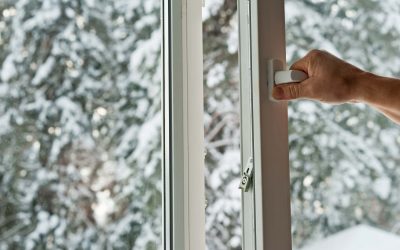Why Cold Weather Doesn’t Improve Indoor Air Quality
Open Your Windows This Winter
EPA studies show the interior air quality in most homes is at least 10 times more polluted than the air outside. And guess what? It’s worse in the winter! Here are some ways you can improve indoor air quality this season.
Unless you are an air-conditioning fanatic, your house is significantly more open letting in fresh air during the spring, summer, and fall. Then, as the weather gets colder and colder, we close our windows and doors, add more insulations, wander around and fill holes with caulking, and trap dirt, dust, and allergens in our homes.
Not only that, we turn on our furnaces and begin burning our fireplaces and wood-burning stoves, which all release toxic gases. Add to all this the VOCs released by textiles, household cleaning products, and even air fresheners, and guess what? The air inside your home is anything but fresh!
It’s unclear what type of exposure or what levels of indoor air pollution are necessary to cause serious health effects, but health-care workers believe the long-term effects can include respiratory problems, heart disease, and cancer.
What Can We Do to Improve Indoor Air Quality?
The EPA has recommended several options to improve air quality indoors. These include:
Controlling the source of the pollution – This is the easiest and least expensive option. Ways to manage a pollutant’s source include:
- Tuning up all indoor fuel burning appliances
- Having your flue and chimney inspected and cleaned if you burn a fireplace or wood stove
- Sealing air leaks between an attached garage and your home
- Using VOC-free household cleaners
- Dusting and vacuuming your house regularly to reduce dust and allergens
Increasing Ventilation – Opening doors and windows when weather permits will increase both ventilation and increase energy expenses. When doing this, make sure you turn your furnace off while the windows are open.

Using an Air Purifier – Both natural and commercial air purifiers can be used. Because of their toxin absorption ability, many houseplants are considered natural air purifiers. Several that are almost impossible to kill are the Spider Plant, the Ficus or Weeping Fig Tree, Boston Fern, and Aloe Vera plant. Or, if you prefer, HEPA air purifiers do an excellent job of filtering dust and mold from the air, and Carbon Filter air purifiers can remove gases and chemicals that are toxic.
Don’t let stale air make you sick this winter. Open the windows and let in the fresh air. With answers to your air quality questions and clean solutions to your concerns, West Michigan’s indoor air quality specialist is Sunrise Heating and Plumbing.
